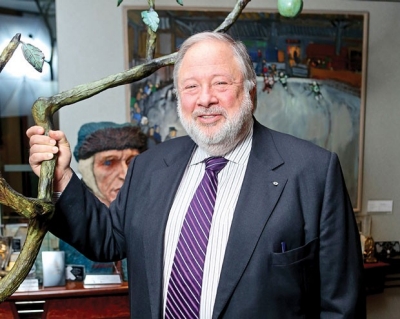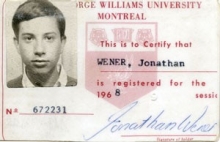JW: “I was never home. I was always in the university. If I wasn’t studying I’d be doing case work or an exhaustive array of activities. I remember running a bed race down De Maisonneuve Boulevard for Commerce Week. I ran a ski trip one year to Kitzbühel. I took 20-odd people for three weeks — airfare, accommodations, skiing, the works — for $275.”
JW: “I have a great sense of joy — in my education and the quality of it, the absolute joy of learning in the real world, and the prominence and practical approach that Sir George implemented relative to the Harvard Business Case approach. We worked management-style in teams, having to count on each other to perform. We also had a great many professors who came from industry and who provided us with real issues and real solutions based on their day-to-day experience.”
JW: “The spirit has changed. Concordia has come into its own and matured to be a very thought-provoking and fine institution of learning. We have faculty members who are among the best in Canada. We’ve grown in status and predominance. We now have a campus we can be proud of. President Alan Shepard has done a phenomenal job and has brought extraordinary leadership skills to the table. We’ve got a great future ahead of us.”
JW: “Concordia is ingrained in my life. We’re inextricably linked. I was very involved as president of the student union and as clubs commissioner. I’d also been one of the first students on the Board of Governors. Second, I met my wife on her first day at Concordia. Third is my business: I got a call in 1975 asking if I’d be interested in buying the Student Union Building on Crescent Street.”
JW: “I said, ‘I’d love to.’ I had $5,000 to my name and borrowed $10,000 from a brave loan officer at Banque Nationale to purchase the building. By June 1, 1975, the fellow I was dealing with to lease the building said he’d rather own it. He gave me a $50,000 profit. By mid-June, I had the start-up capital for Canderel. June 25, 2015, will mark 40 years.”
JW: “I’d had enormous success. I wanted to be in my own business by age 30. By 1980 I was. That capital got me there. I had to work hard for it, sure. The Concordia connection was an essential part of that success all the way through. I felt bound to provide a meaningful donation to the university to show my gratitude for all it had done to prepare me for the world at large and for my own family unit.”
JW: “The greatest legacy that I could leave was the re-planning of the downtown campus and the construction of the various buildings on Sir George Williams and Loyola campuses that occurred during my chairmanship of the Real Estate Planning Committee. [President Emeritus] Fred Lowy shared a vision with me for what Concordia could be and he gave me the rope to get it done.”
JW: “My university years gave me a sense of flourish as an individual. I got a lot of acceptance. As I look back as a mature businessman, the rejections I had as a kid in grade and high school prepared me, because in business you get rejections all the time. How you overcome objections is what’s important. I am actually grateful that I had them because they provided me life lessons and backbone.”
JW: “It’s called No is Maybe on the Road to Yes. It’s about learning to deal with objections and challenges because you’re constantly going to be challenged no matter what you do in life. When I was president of the Jewish General Hospital, I presided over a new strategic plan that required a $200 million fundraising campaign. The highest official amount prior to that was $38 million. Everyone said: ‘You’re dreaming in Technicolor.’ I said let’s think big, not what’s not possible. That’s how I’ve spent my life. The book is about people who’ve told me what I can’t do and my way to get to a yes. We finished the campaign at $201 million seven years in.”
JW: “It’s something I grew up with as a kid. It’s part of my DNA. Sir Winston Churchill said it best: ‘We make a living by what we get, but we make a life by what we give.’ Writing a cheque is easy. Anyone can do that. Many times people would rather write a cheque than do anything. Writing a cheque and giving time, which they’re not making more of, is different. Time is the most precious gift.”


 Jonathan Wener at Canderel in Montreal.
Jonathan Wener at Canderel in Montreal.
 "I have a great sense of joy — in my education and the quality of it, the absolute joy of learning in the real world."
"I have a great sense of joy — in my education and the quality of it, the absolute joy of learning in the real world."